Ethical Analysis of Volkswagen Emission Scandal Report
VerifiedAdded on 2020/05/08
|19
|4672
|136
Report
AI Summary
This report provides a comprehensive analysis of the Volkswagen emission scandal, examining the unethical practices that led to the rigging of emission tests in their diesel vehicles. It details the case description, identifies key participants, and explores the reasons behind the deceptive actions, including pressures related to emission standards and corporate culture. The report further investigates the multifaceted effects of the scandal, encompassing political, economic, and socio-environmental consequences. A critical analysis of sustainability issues and stakeholder management is presented, followed by recommendations for preventing similar ethical failures in the future. The report concludes with a summary of findings and insights into the importance of ethical considerations in business operations.
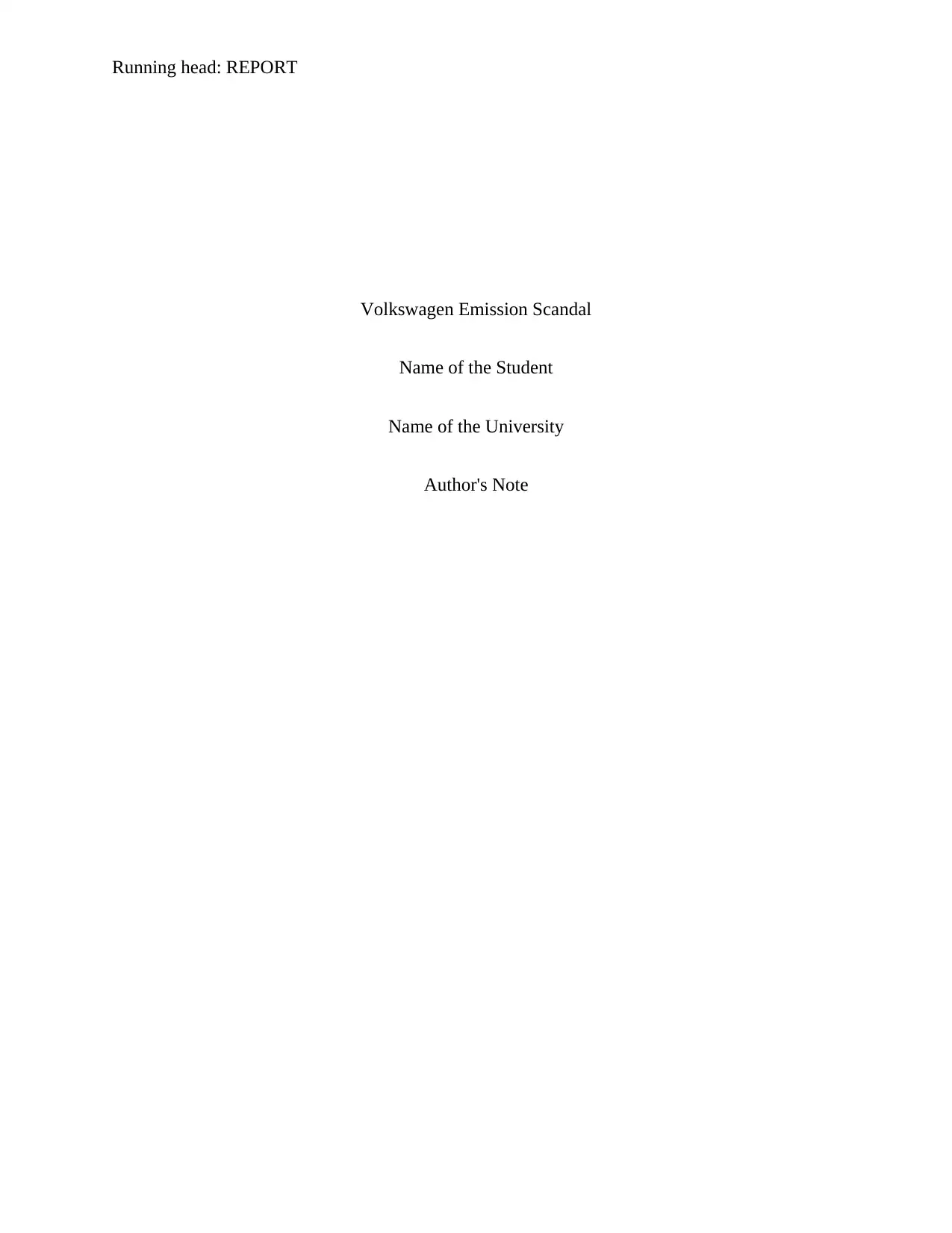
Running head: REPORT
Volkswagen Emission Scandal
Name of the Student
Name of the University
Author's Note
Volkswagen Emission Scandal
Name of the Student
Name of the University
Author's Note
Paraphrase This Document
Need a fresh take? Get an instant paraphrase of this document with our AI Paraphraser
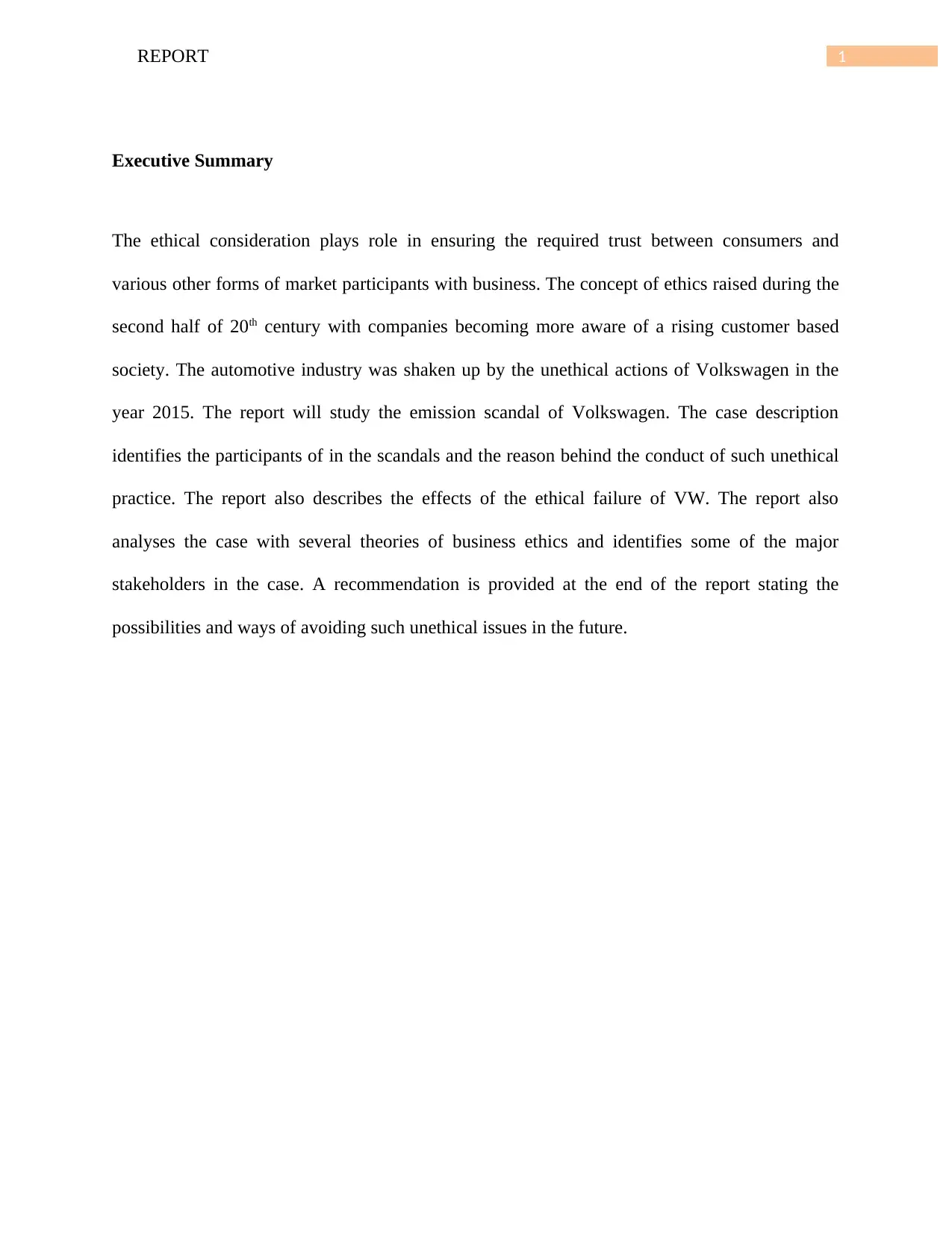
1REPORT
Executive Summary
The ethical consideration plays role in ensuring the required trust between consumers and
various other forms of market participants with business. The concept of ethics raised during the
second half of 20th century with companies becoming more aware of a rising customer based
society. The automotive industry was shaken up by the unethical actions of Volkswagen in the
year 2015. The report will study the emission scandal of Volkswagen. The case description
identifies the participants of in the scandals and the reason behind the conduct of such unethical
practice. The report also describes the effects of the ethical failure of VW. The report also
analyses the case with several theories of business ethics and identifies some of the major
stakeholders in the case. A recommendation is provided at the end of the report stating the
possibilities and ways of avoiding such unethical issues in the future.
Executive Summary
The ethical consideration plays role in ensuring the required trust between consumers and
various other forms of market participants with business. The concept of ethics raised during the
second half of 20th century with companies becoming more aware of a rising customer based
society. The automotive industry was shaken up by the unethical actions of Volkswagen in the
year 2015. The report will study the emission scandal of Volkswagen. The case description
identifies the participants of in the scandals and the reason behind the conduct of such unethical
practice. The report also describes the effects of the ethical failure of VW. The report also
analyses the case with several theories of business ethics and identifies some of the major
stakeholders in the case. A recommendation is provided at the end of the report stating the
possibilities and ways of avoiding such unethical issues in the future.
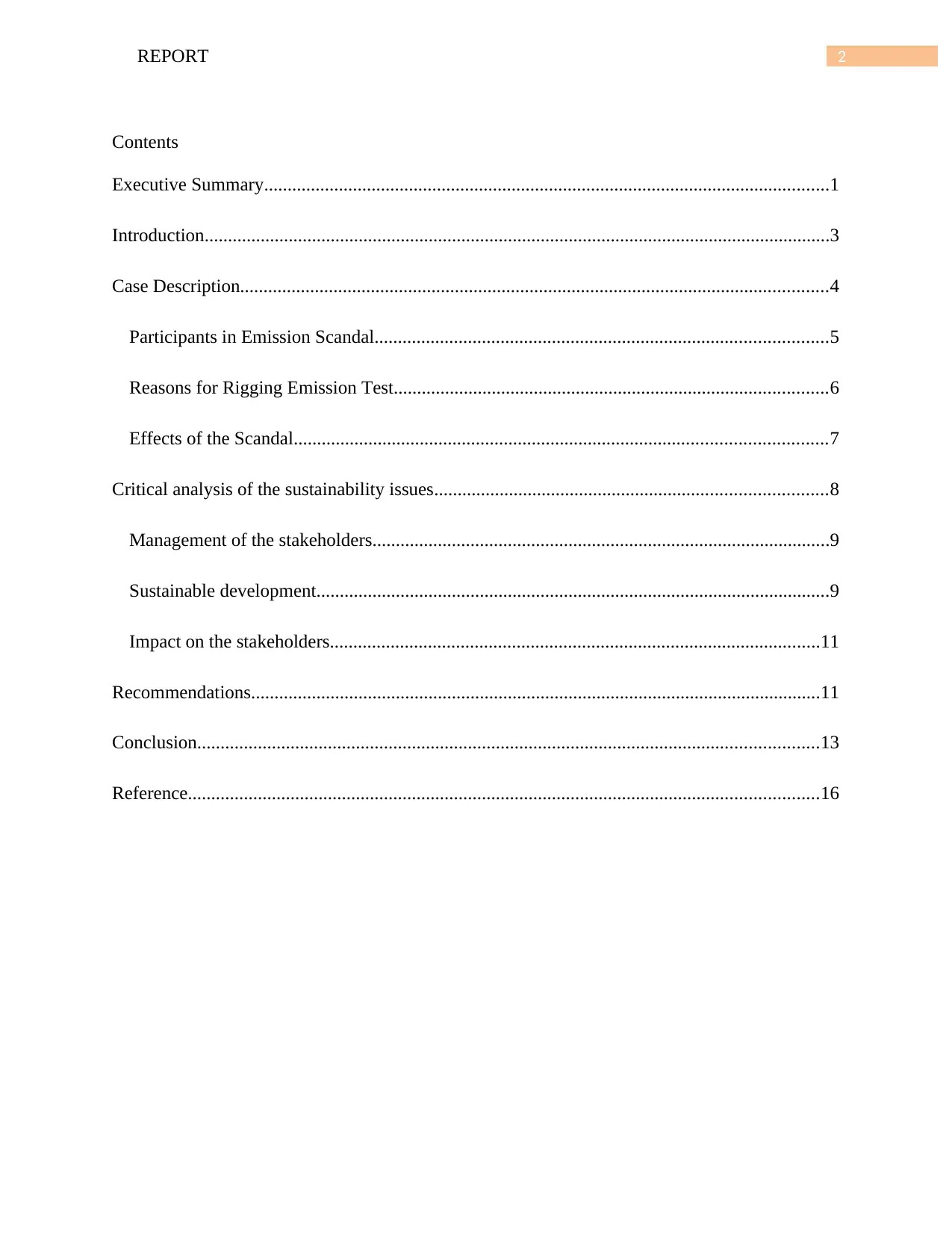
2REPORT
Contents
Executive Summary.........................................................................................................................1
Introduction......................................................................................................................................3
Case Description..............................................................................................................................4
Participants in Emission Scandal.................................................................................................5
Reasons for Rigging Emission Test.............................................................................................6
Effects of the Scandal..................................................................................................................7
Critical analysis of the sustainability issues....................................................................................8
Management of the stakeholders..................................................................................................9
Sustainable development..............................................................................................................9
Impact on the stakeholders.........................................................................................................11
Recommendations..........................................................................................................................11
Conclusion.....................................................................................................................................13
Reference.......................................................................................................................................16
Contents
Executive Summary.........................................................................................................................1
Introduction......................................................................................................................................3
Case Description..............................................................................................................................4
Participants in Emission Scandal.................................................................................................5
Reasons for Rigging Emission Test.............................................................................................6
Effects of the Scandal..................................................................................................................7
Critical analysis of the sustainability issues....................................................................................8
Management of the stakeholders..................................................................................................9
Sustainable development..............................................................................................................9
Impact on the stakeholders.........................................................................................................11
Recommendations..........................................................................................................................11
Conclusion.....................................................................................................................................13
Reference.......................................................................................................................................16
⊘ This is a preview!⊘
Do you want full access?
Subscribe today to unlock all pages.

Trusted by 1+ million students worldwide
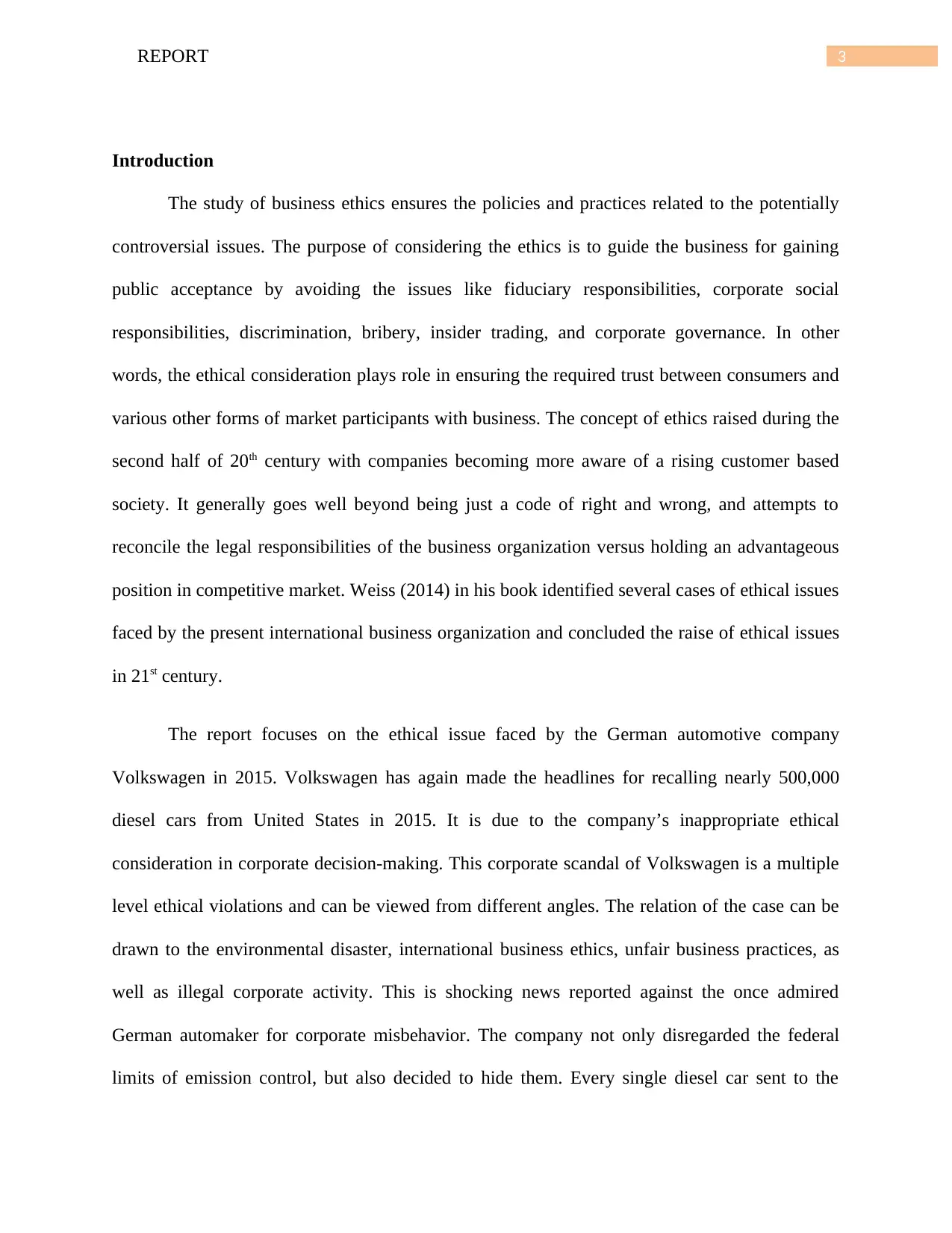
3REPORT
Introduction
The study of business ethics ensures the policies and practices related to the potentially
controversial issues. The purpose of considering the ethics is to guide the business for gaining
public acceptance by avoiding the issues like fiduciary responsibilities, corporate social
responsibilities, discrimination, bribery, insider trading, and corporate governance. In other
words, the ethical consideration plays role in ensuring the required trust between consumers and
various other forms of market participants with business. The concept of ethics raised during the
second half of 20th century with companies becoming more aware of a rising customer based
society. It generally goes well beyond being just a code of right and wrong, and attempts to
reconcile the legal responsibilities of the business organization versus holding an advantageous
position in competitive market. Weiss (2014) in his book identified several cases of ethical issues
faced by the present international business organization and concluded the raise of ethical issues
in 21st century.
The report focuses on the ethical issue faced by the German automotive company
Volkswagen in 2015. Volkswagen has again made the headlines for recalling nearly 500,000
diesel cars from United States in 2015. It is due to the company’s inappropriate ethical
consideration in corporate decision-making. This corporate scandal of Volkswagen is a multiple
level ethical violations and can be viewed from different angles. The relation of the case can be
drawn to the environmental disaster, international business ethics, unfair business practices, as
well as illegal corporate activity. This is shocking news reported against the once admired
German automaker for corporate misbehavior. The company not only disregarded the federal
limits of emission control, but also decided to hide them. Every single diesel car sent to the
Introduction
The study of business ethics ensures the policies and practices related to the potentially
controversial issues. The purpose of considering the ethics is to guide the business for gaining
public acceptance by avoiding the issues like fiduciary responsibilities, corporate social
responsibilities, discrimination, bribery, insider trading, and corporate governance. In other
words, the ethical consideration plays role in ensuring the required trust between consumers and
various other forms of market participants with business. The concept of ethics raised during the
second half of 20th century with companies becoming more aware of a rising customer based
society. It generally goes well beyond being just a code of right and wrong, and attempts to
reconcile the legal responsibilities of the business organization versus holding an advantageous
position in competitive market. Weiss (2014) in his book identified several cases of ethical issues
faced by the present international business organization and concluded the raise of ethical issues
in 21st century.
The report focuses on the ethical issue faced by the German automotive company
Volkswagen in 2015. Volkswagen has again made the headlines for recalling nearly 500,000
diesel cars from United States in 2015. It is due to the company’s inappropriate ethical
consideration in corporate decision-making. This corporate scandal of Volkswagen is a multiple
level ethical violations and can be viewed from different angles. The relation of the case can be
drawn to the environmental disaster, international business ethics, unfair business practices, as
well as illegal corporate activity. This is shocking news reported against the once admired
German automaker for corporate misbehavior. The company not only disregarded the federal
limits of emission control, but also decided to hide them. Every single diesel car sent to the
Paraphrase This Document
Need a fresh take? Get an instant paraphrase of this document with our AI Paraphraser
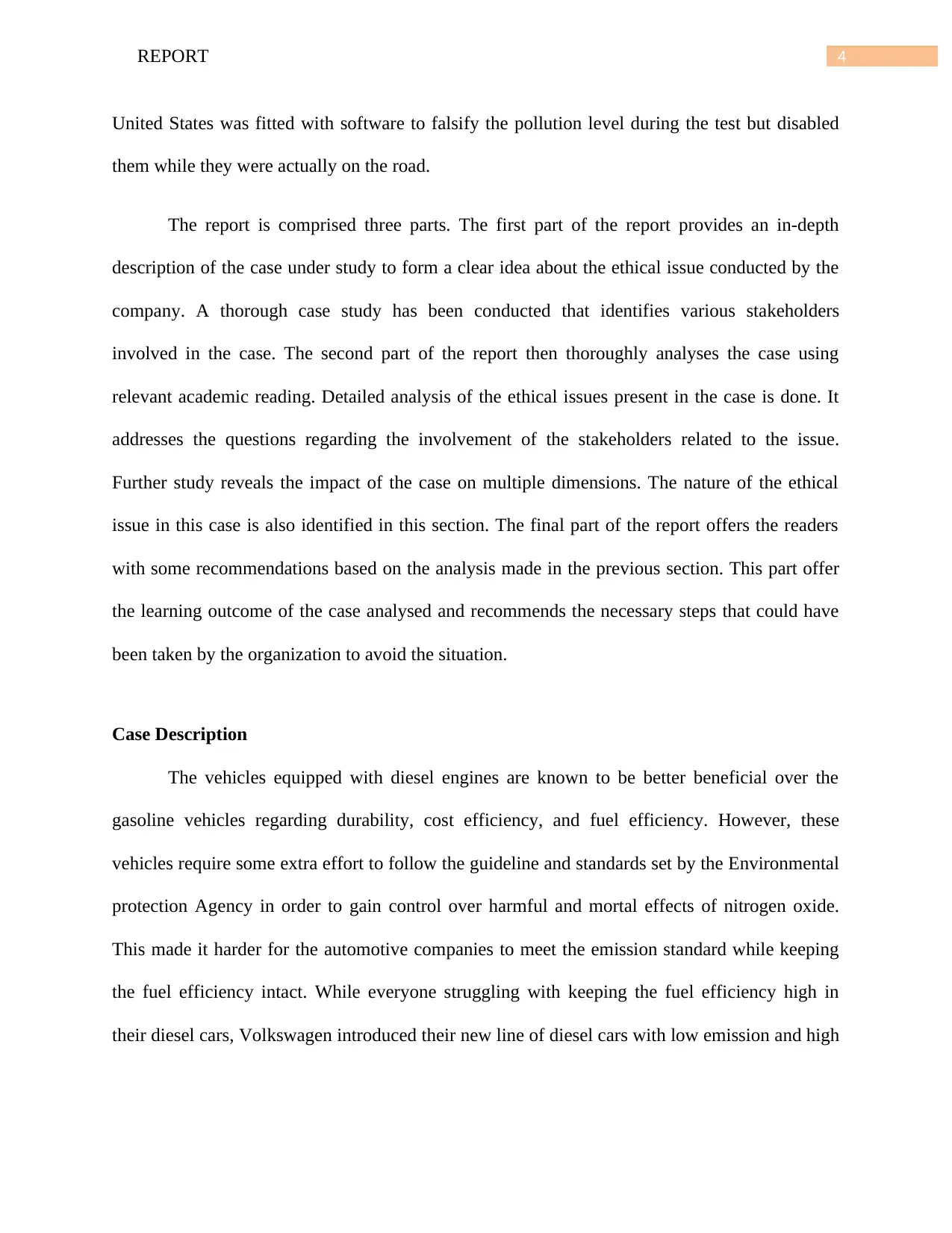
4REPORT
United States was fitted with software to falsify the pollution level during the test but disabled
them while they were actually on the road.
The report is comprised three parts. The first part of the report provides an in-depth
description of the case under study to form a clear idea about the ethical issue conducted by the
company. A thorough case study has been conducted that identifies various stakeholders
involved in the case. The second part of the report then thoroughly analyses the case using
relevant academic reading. Detailed analysis of the ethical issues present in the case is done. It
addresses the questions regarding the involvement of the stakeholders related to the issue.
Further study reveals the impact of the case on multiple dimensions. The nature of the ethical
issue in this case is also identified in this section. The final part of the report offers the readers
with some recommendations based on the analysis made in the previous section. This part offer
the learning outcome of the case analysed and recommends the necessary steps that could have
been taken by the organization to avoid the situation.
Case Description
The vehicles equipped with diesel engines are known to be better beneficial over the
gasoline vehicles regarding durability, cost efficiency, and fuel efficiency. However, these
vehicles require some extra effort to follow the guideline and standards set by the Environmental
protection Agency in order to gain control over harmful and mortal effects of nitrogen oxide.
This made it harder for the automotive companies to meet the emission standard while keeping
the fuel efficiency intact. While everyone struggling with keeping the fuel efficiency high in
their diesel cars, Volkswagen introduced their new line of diesel cars with low emission and high
United States was fitted with software to falsify the pollution level during the test but disabled
them while they were actually on the road.
The report is comprised three parts. The first part of the report provides an in-depth
description of the case under study to form a clear idea about the ethical issue conducted by the
company. A thorough case study has been conducted that identifies various stakeholders
involved in the case. The second part of the report then thoroughly analyses the case using
relevant academic reading. Detailed analysis of the ethical issues present in the case is done. It
addresses the questions regarding the involvement of the stakeholders related to the issue.
Further study reveals the impact of the case on multiple dimensions. The nature of the ethical
issue in this case is also identified in this section. The final part of the report offers the readers
with some recommendations based on the analysis made in the previous section. This part offer
the learning outcome of the case analysed and recommends the necessary steps that could have
been taken by the organization to avoid the situation.
Case Description
The vehicles equipped with diesel engines are known to be better beneficial over the
gasoline vehicles regarding durability, cost efficiency, and fuel efficiency. However, these
vehicles require some extra effort to follow the guideline and standards set by the Environmental
protection Agency in order to gain control over harmful and mortal effects of nitrogen oxide.
This made it harder for the automotive companies to meet the emission standard while keeping
the fuel efficiency intact. While everyone struggling with keeping the fuel efficiency high in
their diesel cars, Volkswagen introduced their new line of diesel cars with low emission and high
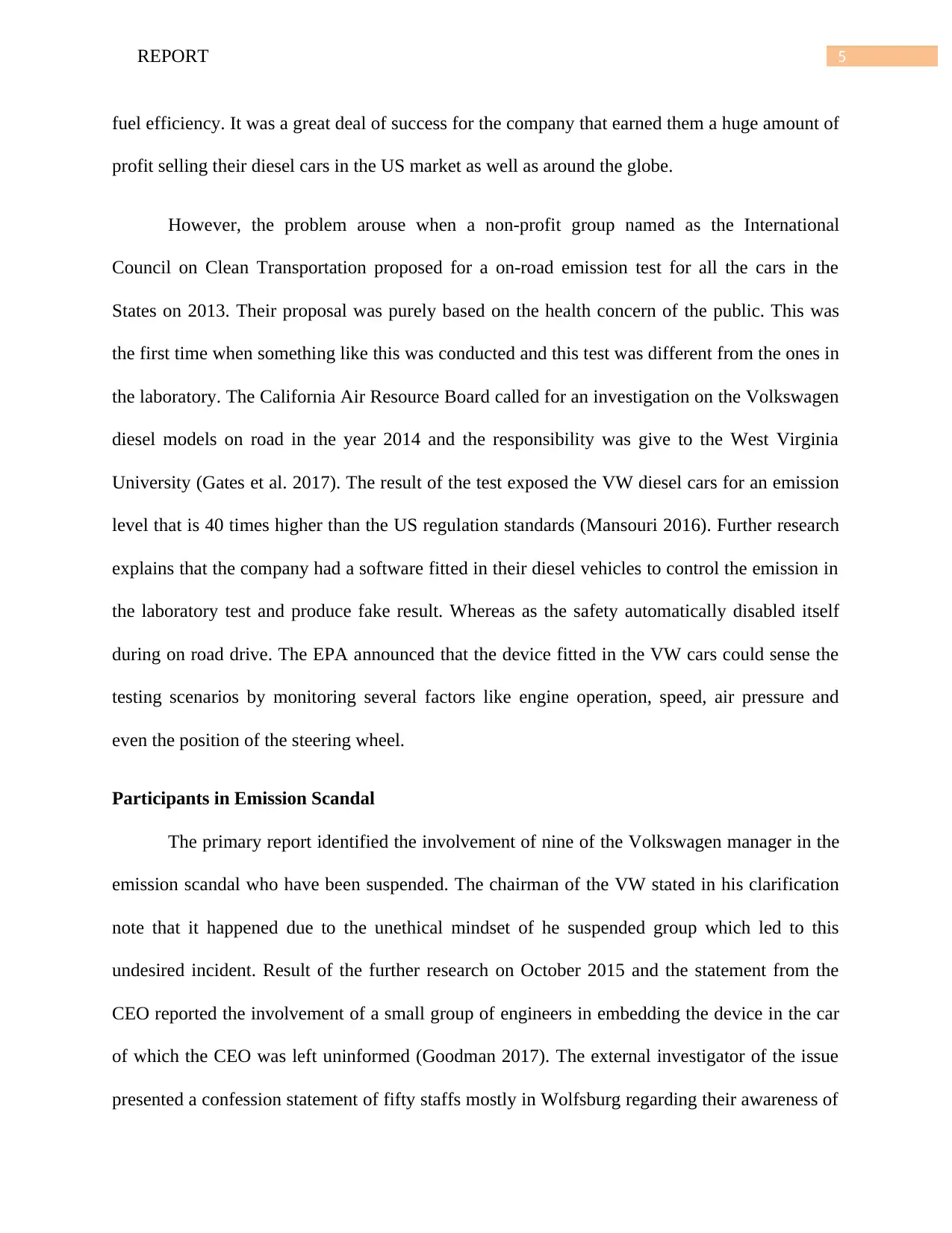
5REPORT
fuel efficiency. It was a great deal of success for the company that earned them a huge amount of
profit selling their diesel cars in the US market as well as around the globe.
However, the problem arouse when a non-profit group named as the International
Council on Clean Transportation proposed for a on-road emission test for all the cars in the
States on 2013. Their proposal was purely based on the health concern of the public. This was
the first time when something like this was conducted and this test was different from the ones in
the laboratory. The California Air Resource Board called for an investigation on the Volkswagen
diesel models on road in the year 2014 and the responsibility was give to the West Virginia
University (Gates et al. 2017). The result of the test exposed the VW diesel cars for an emission
level that is 40 times higher than the US regulation standards (Mansouri 2016). Further research
explains that the company had a software fitted in their diesel vehicles to control the emission in
the laboratory test and produce fake result. Whereas as the safety automatically disabled itself
during on road drive. The EPA announced that the device fitted in the VW cars could sense the
testing scenarios by monitoring several factors like engine operation, speed, air pressure and
even the position of the steering wheel.
Participants in Emission Scandal
The primary report identified the involvement of nine of the Volkswagen manager in the
emission scandal who have been suspended. The chairman of the VW stated in his clarification
note that it happened due to the unethical mindset of he suspended group which led to this
undesired incident. Result of the further research on October 2015 and the statement from the
CEO reported the involvement of a small group of engineers in embedding the device in the car
of which the CEO was left uninformed (Goodman 2017). The external investigator of the issue
presented a confession statement of fifty staffs mostly in Wolfsburg regarding their awareness of
fuel efficiency. It was a great deal of success for the company that earned them a huge amount of
profit selling their diesel cars in the US market as well as around the globe.
However, the problem arouse when a non-profit group named as the International
Council on Clean Transportation proposed for a on-road emission test for all the cars in the
States on 2013. Their proposal was purely based on the health concern of the public. This was
the first time when something like this was conducted and this test was different from the ones in
the laboratory. The California Air Resource Board called for an investigation on the Volkswagen
diesel models on road in the year 2014 and the responsibility was give to the West Virginia
University (Gates et al. 2017). The result of the test exposed the VW diesel cars for an emission
level that is 40 times higher than the US regulation standards (Mansouri 2016). Further research
explains that the company had a software fitted in their diesel vehicles to control the emission in
the laboratory test and produce fake result. Whereas as the safety automatically disabled itself
during on road drive. The EPA announced that the device fitted in the VW cars could sense the
testing scenarios by monitoring several factors like engine operation, speed, air pressure and
even the position of the steering wheel.
Participants in Emission Scandal
The primary report identified the involvement of nine of the Volkswagen manager in the
emission scandal who have been suspended. The chairman of the VW stated in his clarification
note that it happened due to the unethical mindset of he suspended group which led to this
undesired incident. Result of the further research on October 2015 and the statement from the
CEO reported the involvement of a small group of engineers in embedding the device in the car
of which the CEO was left uninformed (Goodman 2017). The external investigator of the issue
presented a confession statement of fifty staffs mostly in Wolfsburg regarding their awareness of
⊘ This is a preview!⊘
Do you want full access?
Subscribe today to unlock all pages.

Trusted by 1+ million students worldwide
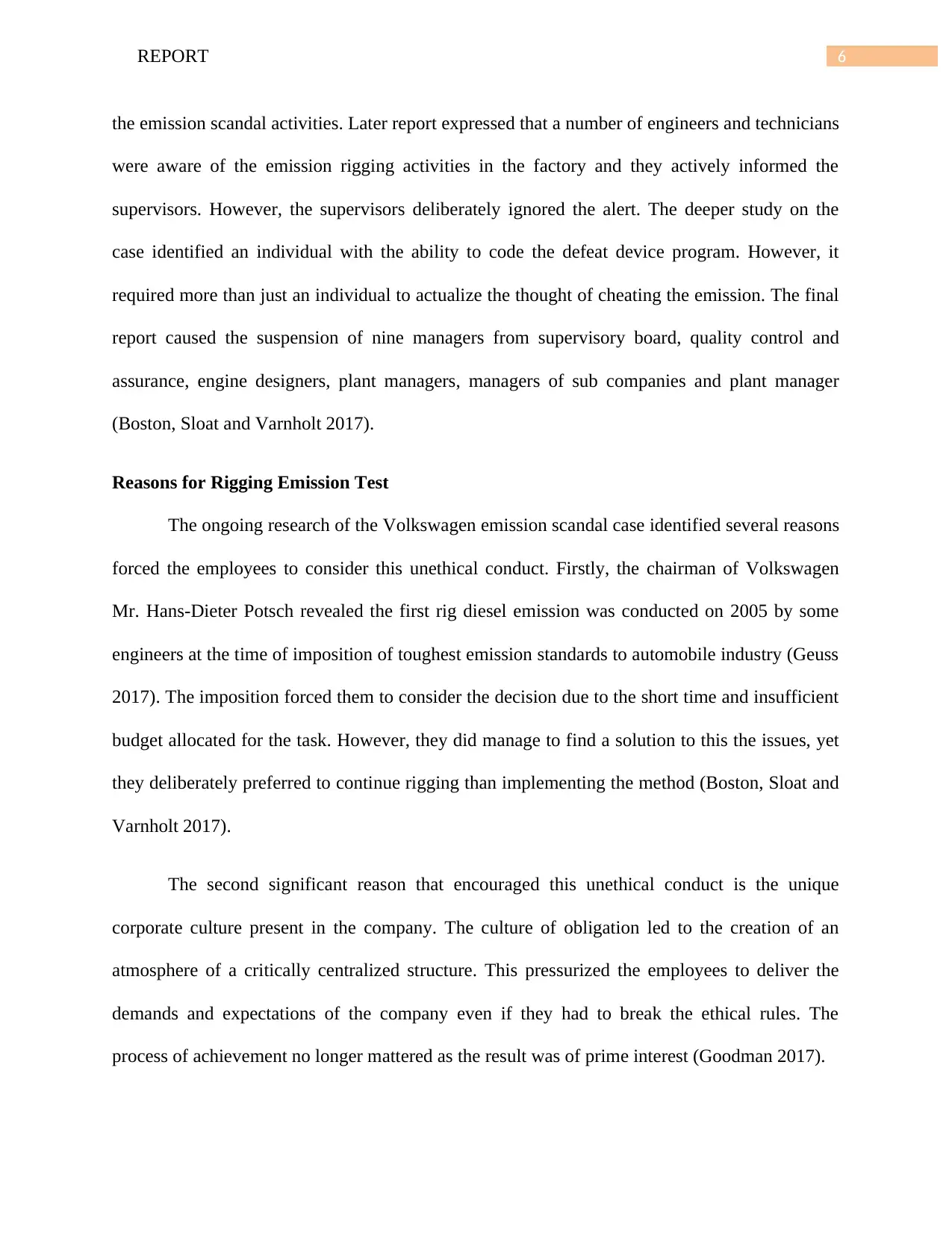
6REPORT
the emission scandal activities. Later report expressed that a number of engineers and technicians
were aware of the emission rigging activities in the factory and they actively informed the
supervisors. However, the supervisors deliberately ignored the alert. The deeper study on the
case identified an individual with the ability to code the defeat device program. However, it
required more than just an individual to actualize the thought of cheating the emission. The final
report caused the suspension of nine managers from supervisory board, quality control and
assurance, engine designers, plant managers, managers of sub companies and plant manager
(Boston, Sloat and Varnholt 2017).
Reasons for Rigging Emission Test
The ongoing research of the Volkswagen emission scandal case identified several reasons
forced the employees to consider this unethical conduct. Firstly, the chairman of Volkswagen
Mr. Hans-Dieter Potsch revealed the first rig diesel emission was conducted on 2005 by some
engineers at the time of imposition of toughest emission standards to automobile industry (Geuss
2017). The imposition forced them to consider the decision due to the short time and insufficient
budget allocated for the task. However, they did manage to find a solution to this the issues, yet
they deliberately preferred to continue rigging than implementing the method (Boston, Sloat and
Varnholt 2017).
The second significant reason that encouraged this unethical conduct is the unique
corporate culture present in the company. The culture of obligation led to the creation of an
atmosphere of a critically centralized structure. This pressurized the employees to deliver the
demands and expectations of the company even if they had to break the ethical rules. The
process of achievement no longer mattered as the result was of prime interest (Goodman 2017).
the emission scandal activities. Later report expressed that a number of engineers and technicians
were aware of the emission rigging activities in the factory and they actively informed the
supervisors. However, the supervisors deliberately ignored the alert. The deeper study on the
case identified an individual with the ability to code the defeat device program. However, it
required more than just an individual to actualize the thought of cheating the emission. The final
report caused the suspension of nine managers from supervisory board, quality control and
assurance, engine designers, plant managers, managers of sub companies and plant manager
(Boston, Sloat and Varnholt 2017).
Reasons for Rigging Emission Test
The ongoing research of the Volkswagen emission scandal case identified several reasons
forced the employees to consider this unethical conduct. Firstly, the chairman of Volkswagen
Mr. Hans-Dieter Potsch revealed the first rig diesel emission was conducted on 2005 by some
engineers at the time of imposition of toughest emission standards to automobile industry (Geuss
2017). The imposition forced them to consider the decision due to the short time and insufficient
budget allocated for the task. However, they did manage to find a solution to this the issues, yet
they deliberately preferred to continue rigging than implementing the method (Boston, Sloat and
Varnholt 2017).
The second significant reason that encouraged this unethical conduct is the unique
corporate culture present in the company. The culture of obligation led to the creation of an
atmosphere of a critically centralized structure. This pressurized the employees to deliver the
demands and expectations of the company even if they had to break the ethical rules. The
process of achievement no longer mattered as the result was of prime interest (Goodman 2017).
Paraphrase This Document
Need a fresh take? Get an instant paraphrase of this document with our AI Paraphraser
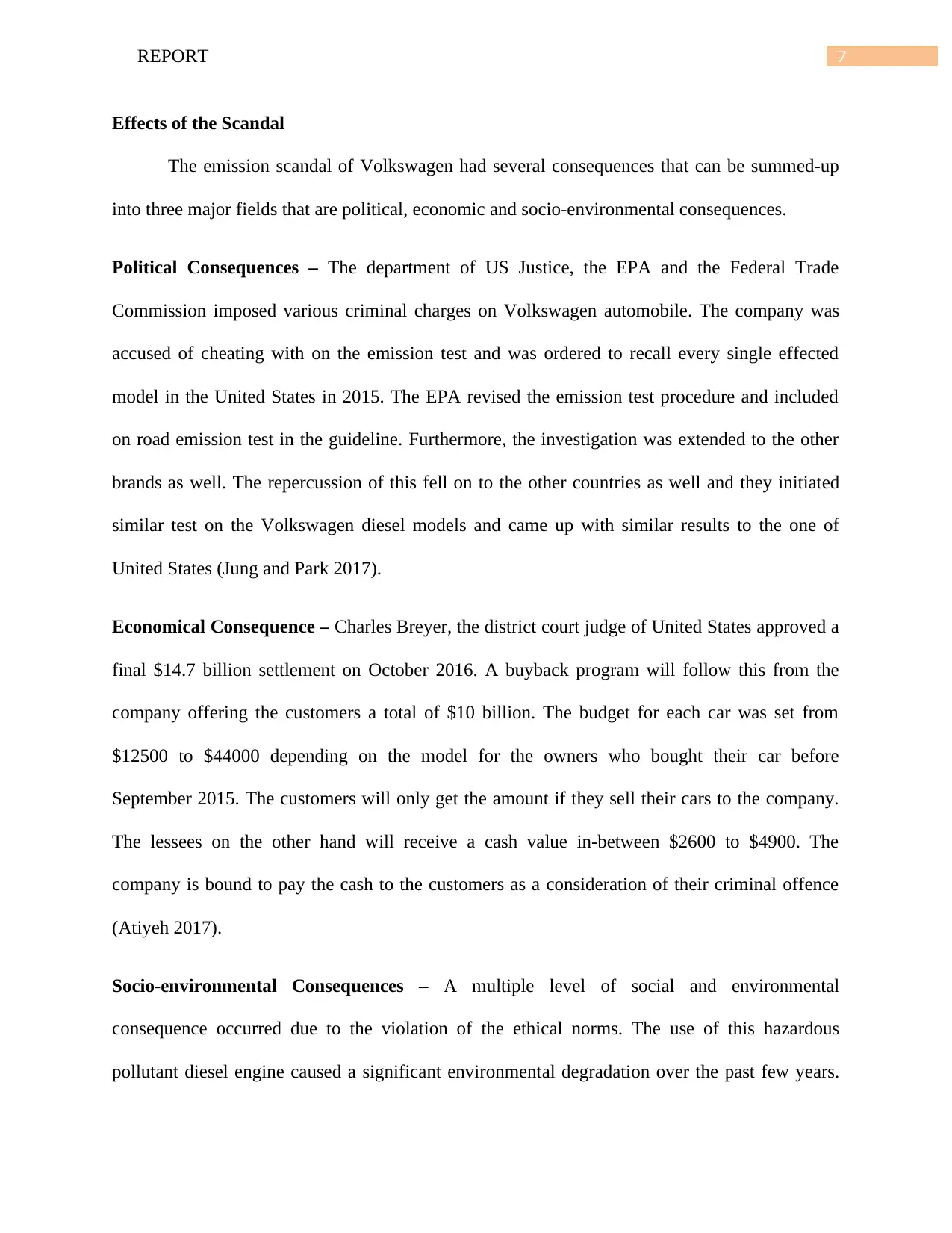
7REPORT
Effects of the Scandal
The emission scandal of Volkswagen had several consequences that can be summed-up
into three major fields that are political, economic and socio-environmental consequences.
Political Consequences – The department of US Justice, the EPA and the Federal Trade
Commission imposed various criminal charges on Volkswagen automobile. The company was
accused of cheating with on the emission test and was ordered to recall every single effected
model in the United States in 2015. The EPA revised the emission test procedure and included
on road emission test in the guideline. Furthermore, the investigation was extended to the other
brands as well. The repercussion of this fell on to the other countries as well and they initiated
similar test on the Volkswagen diesel models and came up with similar results to the one of
United States (Jung and Park 2017).
Economical Consequence – Charles Breyer, the district court judge of United States approved a
final $14.7 billion settlement on October 2016. A buyback program will follow this from the
company offering the customers a total of $10 billion. The budget for each car was set from
$12500 to $44000 depending on the model for the owners who bought their car before
September 2015. The customers will only get the amount if they sell their cars to the company.
The lessees on the other hand will receive a cash value in-between $2600 to $4900. The
company is bound to pay the cash to the customers as a consideration of their criminal offence
(Atiyeh 2017).
Socio-environmental Consequences – A multiple level of social and environmental
consequence occurred due to the violation of the ethical norms. The use of this hazardous
pollutant diesel engine caused a significant environmental degradation over the past few years.
Effects of the Scandal
The emission scandal of Volkswagen had several consequences that can be summed-up
into three major fields that are political, economic and socio-environmental consequences.
Political Consequences – The department of US Justice, the EPA and the Federal Trade
Commission imposed various criminal charges on Volkswagen automobile. The company was
accused of cheating with on the emission test and was ordered to recall every single effected
model in the United States in 2015. The EPA revised the emission test procedure and included
on road emission test in the guideline. Furthermore, the investigation was extended to the other
brands as well. The repercussion of this fell on to the other countries as well and they initiated
similar test on the Volkswagen diesel models and came up with similar results to the one of
United States (Jung and Park 2017).
Economical Consequence – Charles Breyer, the district court judge of United States approved a
final $14.7 billion settlement on October 2016. A buyback program will follow this from the
company offering the customers a total of $10 billion. The budget for each car was set from
$12500 to $44000 depending on the model for the owners who bought their car before
September 2015. The customers will only get the amount if they sell their cars to the company.
The lessees on the other hand will receive a cash value in-between $2600 to $4900. The
company is bound to pay the cash to the customers as a consideration of their criminal offence
(Atiyeh 2017).
Socio-environmental Consequences – A multiple level of social and environmental
consequence occurred due to the violation of the ethical norms. The use of this hazardous
pollutant diesel engine caused a significant environmental degradation over the past few years.
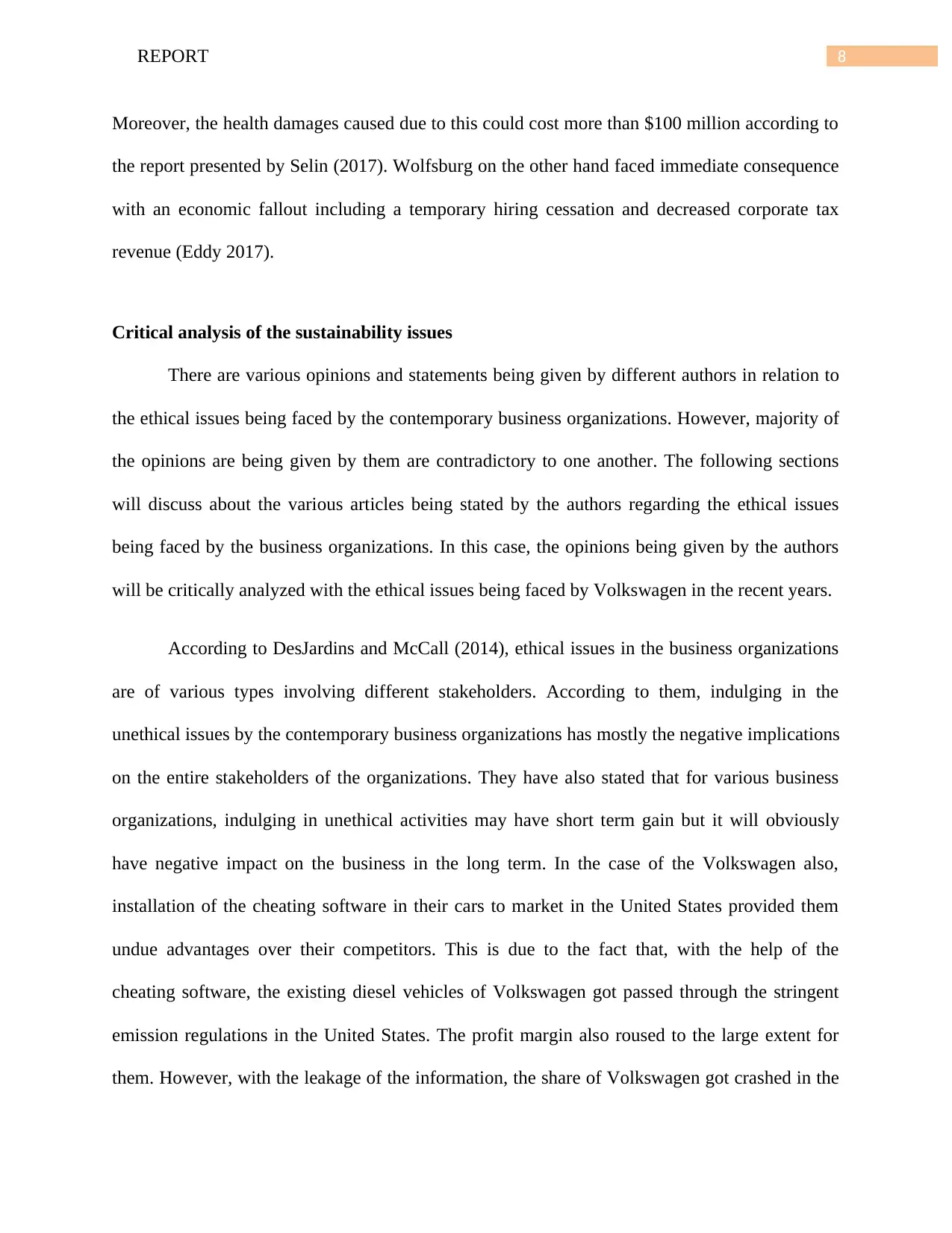
8REPORT
Moreover, the health damages caused due to this could cost more than $100 million according to
the report presented by Selin (2017). Wolfsburg on the other hand faced immediate consequence
with an economic fallout including a temporary hiring cessation and decreased corporate tax
revenue (Eddy 2017).
Critical analysis of the sustainability issues
There are various opinions and statements being given by different authors in relation to
the ethical issues being faced by the contemporary business organizations. However, majority of
the opinions are being given by them are contradictory to one another. The following sections
will discuss about the various articles being stated by the authors regarding the ethical issues
being faced by the business organizations. In this case, the opinions being given by the authors
will be critically analyzed with the ethical issues being faced by Volkswagen in the recent years.
According to DesJardins and McCall (2014), ethical issues in the business organizations
are of various types involving different stakeholders. According to them, indulging in the
unethical issues by the contemporary business organizations has mostly the negative implications
on the entire stakeholders of the organizations. They have also stated that for various business
organizations, indulging in unethical activities may have short term gain but it will obviously
have negative impact on the business in the long term. In the case of the Volkswagen also,
installation of the cheating software in their cars to market in the United States provided them
undue advantages over their competitors. This is due to the fact that, with the help of the
cheating software, the existing diesel vehicles of Volkswagen got passed through the stringent
emission regulations in the United States. The profit margin also roused to the large extent for
them. However, with the leakage of the information, the share of Volkswagen got crashed in the
Moreover, the health damages caused due to this could cost more than $100 million according to
the report presented by Selin (2017). Wolfsburg on the other hand faced immediate consequence
with an economic fallout including a temporary hiring cessation and decreased corporate tax
revenue (Eddy 2017).
Critical analysis of the sustainability issues
There are various opinions and statements being given by different authors in relation to
the ethical issues being faced by the contemporary business organizations. However, majority of
the opinions are being given by them are contradictory to one another. The following sections
will discuss about the various articles being stated by the authors regarding the ethical issues
being faced by the business organizations. In this case, the opinions being given by the authors
will be critically analyzed with the ethical issues being faced by Volkswagen in the recent years.
According to DesJardins and McCall (2014), ethical issues in the business organizations
are of various types involving different stakeholders. According to them, indulging in the
unethical issues by the contemporary business organizations has mostly the negative implications
on the entire stakeholders of the organizations. They have also stated that for various business
organizations, indulging in unethical activities may have short term gain but it will obviously
have negative impact on the business in the long term. In the case of the Volkswagen also,
installation of the cheating software in their cars to market in the United States provided them
undue advantages over their competitors. This is due to the fact that, with the help of the
cheating software, the existing diesel vehicles of Volkswagen got passed through the stringent
emission regulations in the United States. The profit margin also roused to the large extent for
them. However, with the leakage of the information, the share of Volkswagen got crashed in the
⊘ This is a preview!⊘
Do you want full access?
Subscribe today to unlock all pages.

Trusted by 1+ million students worldwide
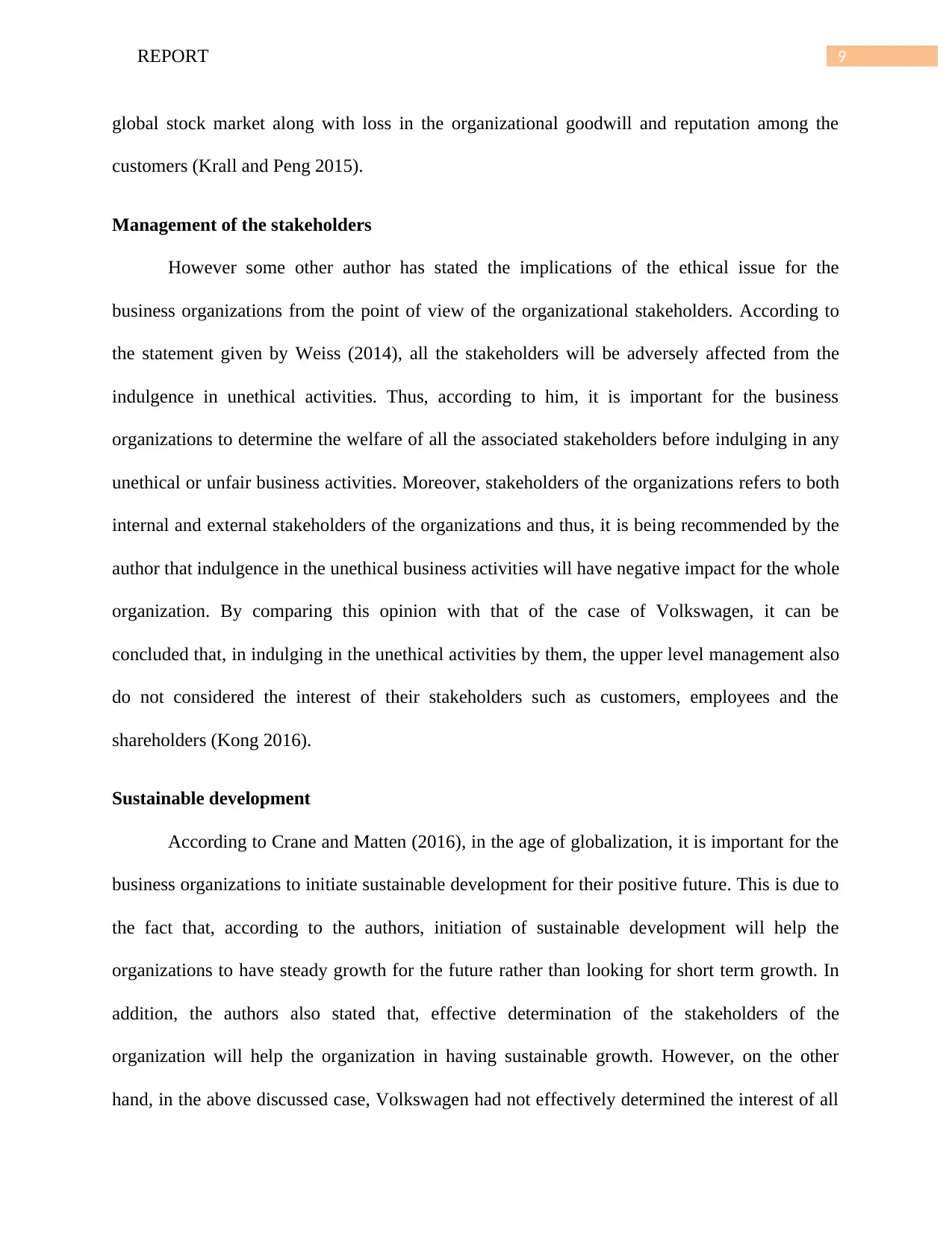
9REPORT
global stock market along with loss in the organizational goodwill and reputation among the
customers (Krall and Peng 2015).
Management of the stakeholders
However some other author has stated the implications of the ethical issue for the
business organizations from the point of view of the organizational stakeholders. According to
the statement given by Weiss (2014), all the stakeholders will be adversely affected from the
indulgence in unethical activities. Thus, according to him, it is important for the business
organizations to determine the welfare of all the associated stakeholders before indulging in any
unethical or unfair business activities. Moreover, stakeholders of the organizations refers to both
internal and external stakeholders of the organizations and thus, it is being recommended by the
author that indulgence in the unethical business activities will have negative impact for the whole
organization. By comparing this opinion with that of the case of Volkswagen, it can be
concluded that, in indulging in the unethical activities by them, the upper level management also
do not considered the interest of their stakeholders such as customers, employees and the
shareholders (Kong 2016).
Sustainable development
According to Crane and Matten (2016), in the age of globalization, it is important for the
business organizations to initiate sustainable development for their positive future. This is due to
the fact that, according to the authors, initiation of sustainable development will help the
organizations to have steady growth for the future rather than looking for short term growth. In
addition, the authors also stated that, effective determination of the stakeholders of the
organization will help the organization in having sustainable growth. However, on the other
hand, in the above discussed case, Volkswagen had not effectively determined the interest of all
global stock market along with loss in the organizational goodwill and reputation among the
customers (Krall and Peng 2015).
Management of the stakeholders
However some other author has stated the implications of the ethical issue for the
business organizations from the point of view of the organizational stakeholders. According to
the statement given by Weiss (2014), all the stakeholders will be adversely affected from the
indulgence in unethical activities. Thus, according to him, it is important for the business
organizations to determine the welfare of all the associated stakeholders before indulging in any
unethical or unfair business activities. Moreover, stakeholders of the organizations refers to both
internal and external stakeholders of the organizations and thus, it is being recommended by the
author that indulgence in the unethical business activities will have negative impact for the whole
organization. By comparing this opinion with that of the case of Volkswagen, it can be
concluded that, in indulging in the unethical activities by them, the upper level management also
do not considered the interest of their stakeholders such as customers, employees and the
shareholders (Kong 2016).
Sustainable development
According to Crane and Matten (2016), in the age of globalization, it is important for the
business organizations to initiate sustainable development for their positive future. This is due to
the fact that, according to the authors, initiation of sustainable development will help the
organizations to have steady growth for the future rather than looking for short term growth. In
addition, the authors also stated that, effective determination of the stakeholders of the
organization will help the organization in having sustainable growth. However, on the other
hand, in the above discussed case, Volkswagen had not effectively determined the interest of all
Paraphrase This Document
Need a fresh take? Get an instant paraphrase of this document with our AI Paraphraser
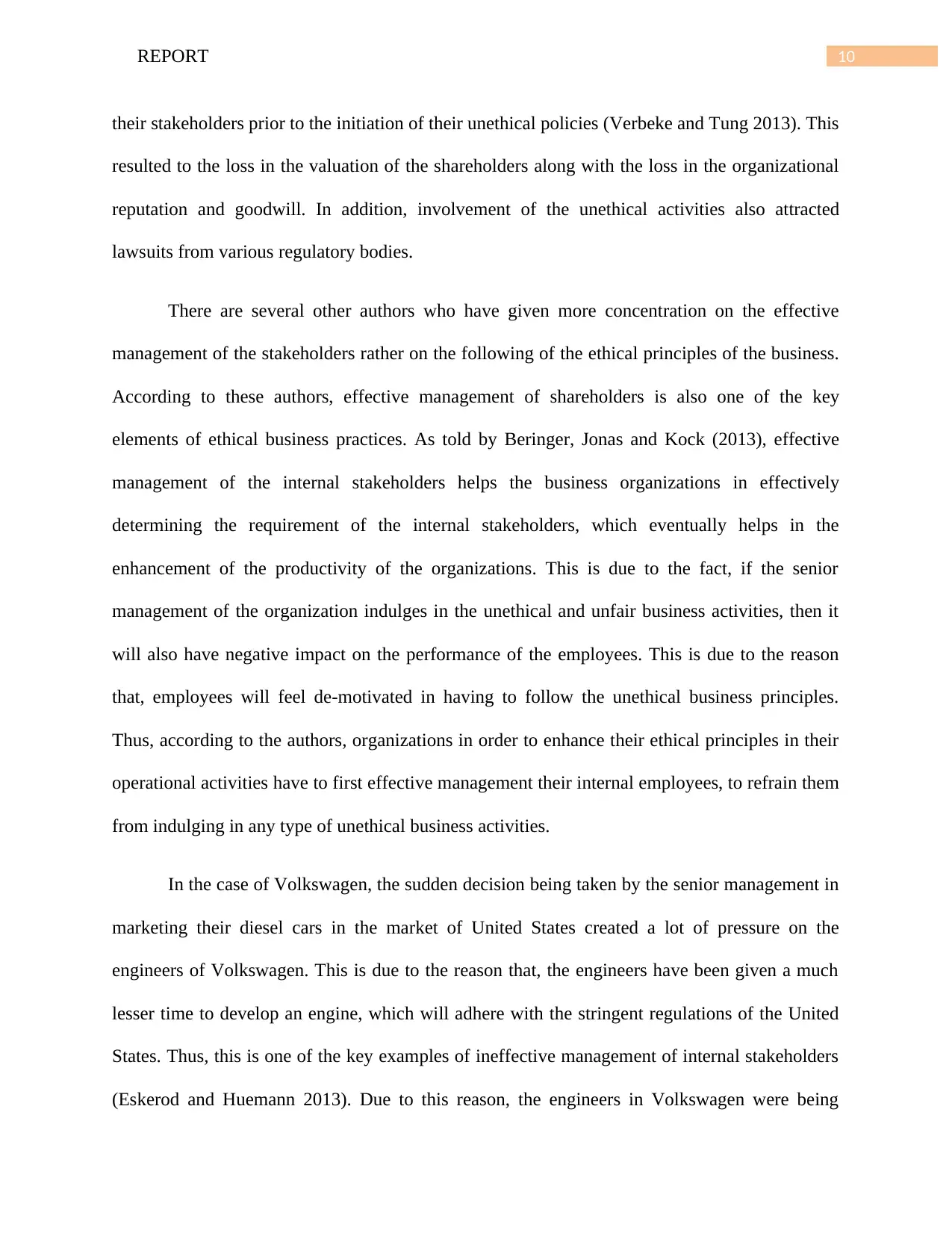
10REPORT
their stakeholders prior to the initiation of their unethical policies (Verbeke and Tung 2013). This
resulted to the loss in the valuation of the shareholders along with the loss in the organizational
reputation and goodwill. In addition, involvement of the unethical activities also attracted
lawsuits from various regulatory bodies.
There are several other authors who have given more concentration on the effective
management of the stakeholders rather on the following of the ethical principles of the business.
According to these authors, effective management of shareholders is also one of the key
elements of ethical business practices. As told by Beringer, Jonas and Kock (2013), effective
management of the internal stakeholders helps the business organizations in effectively
determining the requirement of the internal stakeholders, which eventually helps in the
enhancement of the productivity of the organizations. This is due to the fact, if the senior
management of the organization indulges in the unethical and unfair business activities, then it
will also have negative impact on the performance of the employees. This is due to the reason
that, employees will feel de-motivated in having to follow the unethical business principles.
Thus, according to the authors, organizations in order to enhance their ethical principles in their
operational activities have to first effective management their internal employees, to refrain them
from indulging in any type of unethical business activities.
In the case of Volkswagen, the sudden decision being taken by the senior management in
marketing their diesel cars in the market of United States created a lot of pressure on the
engineers of Volkswagen. This is due to the reason that, the engineers have been given a much
lesser time to develop an engine, which will adhere with the stringent regulations of the United
States. Thus, this is one of the key examples of ineffective management of internal stakeholders
(Eskerod and Huemann 2013). Due to this reason, the engineers in Volkswagen were being
their stakeholders prior to the initiation of their unethical policies (Verbeke and Tung 2013). This
resulted to the loss in the valuation of the shareholders along with the loss in the organizational
reputation and goodwill. In addition, involvement of the unethical activities also attracted
lawsuits from various regulatory bodies.
There are several other authors who have given more concentration on the effective
management of the stakeholders rather on the following of the ethical principles of the business.
According to these authors, effective management of shareholders is also one of the key
elements of ethical business practices. As told by Beringer, Jonas and Kock (2013), effective
management of the internal stakeholders helps the business organizations in effectively
determining the requirement of the internal stakeholders, which eventually helps in the
enhancement of the productivity of the organizations. This is due to the fact, if the senior
management of the organization indulges in the unethical and unfair business activities, then it
will also have negative impact on the performance of the employees. This is due to the reason
that, employees will feel de-motivated in having to follow the unethical business principles.
Thus, according to the authors, organizations in order to enhance their ethical principles in their
operational activities have to first effective management their internal employees, to refrain them
from indulging in any type of unethical business activities.
In the case of Volkswagen, the sudden decision being taken by the senior management in
marketing their diesel cars in the market of United States created a lot of pressure on the
engineers of Volkswagen. This is due to the reason that, the engineers have been given a much
lesser time to develop an engine, which will adhere with the stringent regulations of the United
States. Thus, this is one of the key examples of ineffective management of internal stakeholders
(Eskerod and Huemann 2013). Due to this reason, the engineers in Volkswagen were being
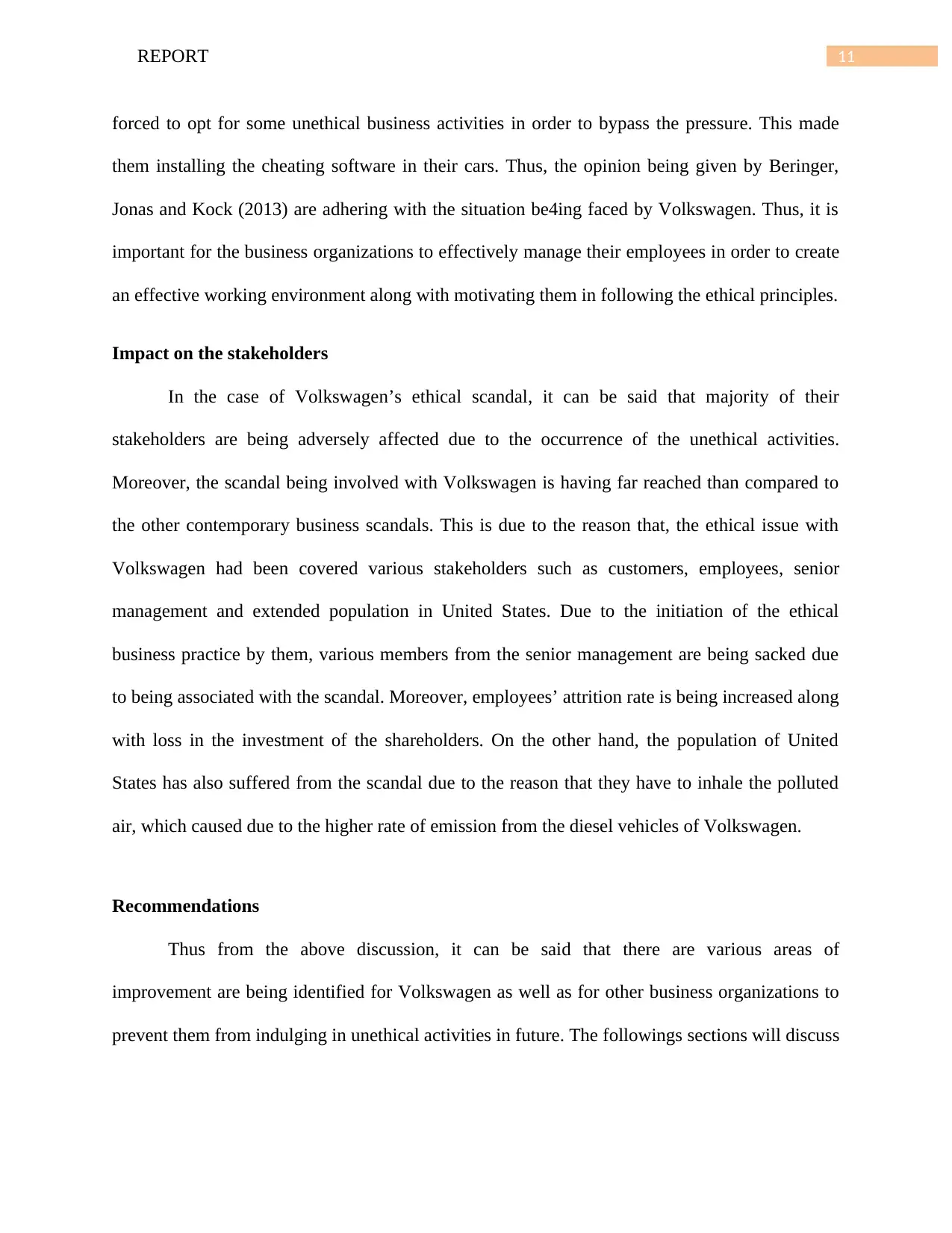
11REPORT
forced to opt for some unethical business activities in order to bypass the pressure. This made
them installing the cheating software in their cars. Thus, the opinion being given by Beringer,
Jonas and Kock (2013) are adhering with the situation be4ing faced by Volkswagen. Thus, it is
important for the business organizations to effectively manage their employees in order to create
an effective working environment along with motivating them in following the ethical principles.
Impact on the stakeholders
In the case of Volkswagen’s ethical scandal, it can be said that majority of their
stakeholders are being adversely affected due to the occurrence of the unethical activities.
Moreover, the scandal being involved with Volkswagen is having far reached than compared to
the other contemporary business scandals. This is due to the reason that, the ethical issue with
Volkswagen had been covered various stakeholders such as customers, employees, senior
management and extended population in United States. Due to the initiation of the ethical
business practice by them, various members from the senior management are being sacked due
to being associated with the scandal. Moreover, employees’ attrition rate is being increased along
with loss in the investment of the shareholders. On the other hand, the population of United
States has also suffered from the scandal due to the reason that they have to inhale the polluted
air, which caused due to the higher rate of emission from the diesel vehicles of Volkswagen.
Recommendations
Thus from the above discussion, it can be said that there are various areas of
improvement are being identified for Volkswagen as well as for other business organizations to
prevent them from indulging in unethical activities in future. The followings sections will discuss
forced to opt for some unethical business activities in order to bypass the pressure. This made
them installing the cheating software in their cars. Thus, the opinion being given by Beringer,
Jonas and Kock (2013) are adhering with the situation be4ing faced by Volkswagen. Thus, it is
important for the business organizations to effectively manage their employees in order to create
an effective working environment along with motivating them in following the ethical principles.
Impact on the stakeholders
In the case of Volkswagen’s ethical scandal, it can be said that majority of their
stakeholders are being adversely affected due to the occurrence of the unethical activities.
Moreover, the scandal being involved with Volkswagen is having far reached than compared to
the other contemporary business scandals. This is due to the reason that, the ethical issue with
Volkswagen had been covered various stakeholders such as customers, employees, senior
management and extended population in United States. Due to the initiation of the ethical
business practice by them, various members from the senior management are being sacked due
to being associated with the scandal. Moreover, employees’ attrition rate is being increased along
with loss in the investment of the shareholders. On the other hand, the population of United
States has also suffered from the scandal due to the reason that they have to inhale the polluted
air, which caused due to the higher rate of emission from the diesel vehicles of Volkswagen.
Recommendations
Thus from the above discussion, it can be said that there are various areas of
improvement are being identified for Volkswagen as well as for other business organizations to
prevent them from indulging in unethical activities in future. The followings sections will discuss
⊘ This is a preview!⊘
Do you want full access?
Subscribe today to unlock all pages.

Trusted by 1+ million students worldwide
1 out of 19
Related Documents
Your All-in-One AI-Powered Toolkit for Academic Success.
+13062052269
info@desklib.com
Available 24*7 on WhatsApp / Email
![[object Object]](/_next/static/media/star-bottom.7253800d.svg)
Unlock your academic potential
Copyright © 2020–2026 A2Z Services. All Rights Reserved. Developed and managed by ZUCOL.





